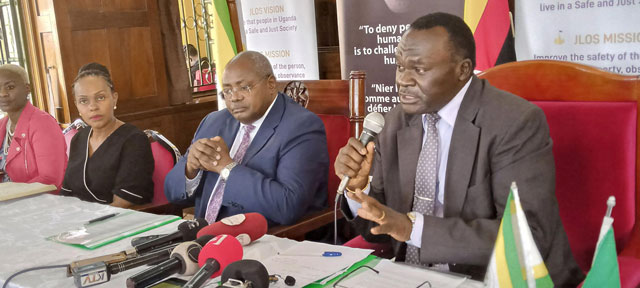
Kampala, Uganda | THE INDEPENDENT | Delegates from the African Union Court on Human and People’s Rights are expected to adopt a new plan of action for arbitration of cases when they converge in Kampala next week. The teams will be in Uganda for a high-level dialogue on emerging Human rights issues in member states.
It will focus on the suppression of Human Rights and Freedoms, terrorism and corruption, religious radicalization, Human Trafficking, Migrant Crisis and contemporary Refugees, among other issues.
This is the first time that the Court is hosting its meeting outside its headquarters in Arusha, Tanzania since the introduction of the Biennial Judicial Dialogue on Human and People’s Rights in 2010. Some of the issues it has debated and developed action plans on including the Roles of Courts in promotion, elections, protection and defence of Human Rights.
Justice Alphonse Owiny Dollo, the Deputy Chief Justice says the dialogue which will begin on October 30, through to November 1, at the Commonwealth Resort Munyonyo will strengthen the capacity of African Judiciaries in the promotion and protection of the rule of laws and human rights.
On the sidelines of the Dialogue, the Judiciary will interface with the Media in Africa to discuss Freedom and Safety of Journalists as well as Media training on reporting on the African Human rights mechanisms. The training and the dialogues will draw some of the best brains in the journalism industry in Africa.
Principal Judge Yorokamu Bamwine, the Chairperson of the National Organizing Committee for the High-Level Judicial Summit says the roles of the African court in Galvanizing Judicial reforms in member countries are phenomenal for ensuring quality justice.
Bamwine told the Press from the High Court Building in Kampala on Thursday afternoon that the recommendations of the African Court are already being implemented in Uganda in recently launched practice directions.
Since formation in 2010, the Dialogue has deliberated on enhancing judicial services in Africa which culminated into the digitization of judicial services through video conferencing. The other is the connection of International Human Rights Instruments with the National Justice Mechanisms.
Grace Wakio Kakai, the Head of Legal Division of the African Court says the dialogue helps African judiciaries to borrow and use some of the jurisprudence in other countries in their national matters.
In the past, the Court ruled that the Tanzanian government must accommodate the issue of Independent Candidates in its Constitution to uphold the Democratic Rights of the Citizens of Tanzania. The court has also made two critical decisions related to the practice of journalism in Burkina Faso in which Defamation was decriminalized and Journalists safety during Investigative Journalism Missions.
The President of the African Court on Human and People’s Rights Justice Sylvain Ore says the past three meetings have reaffirmed the importance of the dialogue as a platform for the African National Judiciaries to discuss opportunities and continuing Challenges relating to their functions.
******
URN
 The Independent Uganda: You get the Truth we Pay the Price
The Independent Uganda: You get the Truth we Pay the Price





